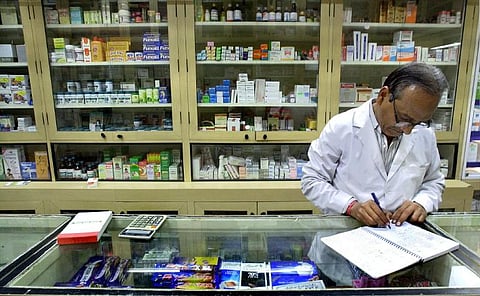

The Indian pharmaceutical industry represents the great paradox that this republic is. It needs no introduction after its performance worldwide during the pandemic years.
Before further dwelling on the highs and lows of the industry, it will be interesting to glance at India’s pharmaceutical muscle.
The industry was valued at an estimated US$42 billion in 2021. India is the world's largest provider of generic medicines by volume, with a 20% share of total global pharmaceutical exports. It is also the largest vaccine supplier in the world by volume, accounting for more than 50% of all vaccines manufactured in the world.
With industry-standards-compliant mega-production capabilities and a large number of skilled domestic workforce, Indian exports meet the standards and requirements of highly regulated markets of the USA, UK, European Union, and Canada.
According to the department of pharmaceuticals, Union ministry of chemicals and fertilizers, the domestic pharmaceutical market turnover reached Rs 129,015 crore (US$18.12 billion) in 2018, growing 9.4% year-on-year with export revenue pegged at US$17.28 billion in FY18 and US$19.14 billion in FY19.
Despite such a record, what defies explanation are some of the most irrational – nay dangerous – acts of the industry.
Last week, a Chennai-based pharmaceutical company suspended the production of a line of eye drops from the US market after that country's health protection agency said they could be contaminated with a drug-resistant bacteria, which has been linked to reports of permanent vision loss and one death from a bloodstream infection.
The decision was taken after a joint inspection with state authorities, a preliminary report submitted by the Central Drugs Standard Control Organisation (CDSCO) said. Earlier last week, the US Centers for Disease Control and Prevention (CDC) sent a health alert to doctors, advising people not to purchase or use EzriCare Artificial Tears, manufactured by Global Pharma Healthcare Pvt Ltd. The trigger was infections of a drug-resistant bacteria, which also caused permanent vision loss to several people, authorities said.
ALSO READ | Endorsements should not endanger health
This is by no means an exception. In October last year, a global alert was issued over four cough syrups after the World Health Organization (WHO) warned they could be linked to the deaths of 66 children in The Gambia, north Africa. The syrups have been "potentially linked with acute kidney injuries and 66 deaths among children", it said.
The products were manufactured by an Indian company, Maiden Pharmaceuticals, which had failed to provide guarantees about their safety, the WHO added for good measure. The WHO's intervention came after medical authorities in The Gambia -- a popular tourist destination -- detected an increase in cases of acute kidney injury among children under the age of five in late July. The Gambia's government has since suspended the use of all paracetamol syrups and has urged people to use tablets instead.
The WHO said that India's CDSCO had indicated that the manufacturer may have only supplied the contaminated medications to The Gambia.
After a few preliminary inquiries, the Indian government halted the Maiden Pharmaceuticals plant that produced the cough and cold syrups that WHO says were tainted with toxic chemicals. A senior WHO official confirmed that Indian government health authorities had shut down the plant after they had shared data showing that samples of four syrup formulations, produced by the firm and tested by the global health agency, contained diethylene glycol and/or ethylene glycol, which are toxic to humans.
This wasn't by any chance Maiden Pharmaceuticals' first violation. They have been pulled up for manufacturing substandard drugs. According to data from the Xtended Licensing and Laboratory Node, a government-owned database, the company had been pulled up at least five times in Kerala alone in the past few years for substandard tablets. In 2011, it was blacklisted by the Bihar government.
In 2014, Maiden was among 66 other Indian companies blacklisted by the Vietnam government for violating Quality Control Regulations and Drug Regulations.
Indian authorities -- both at the central and state level -- need to get their act together. The fact that such contraventions continue to take place is because most states turn a blind eye to best practices, interested as they are in the licensing revenue that the industry offers.
The bigger problem is transparency at the level of regulatory clearances. Indian law requires every manufacturing facility to be inspected annually for good manufacturing practice (GMP) compliance, which takes place with one significant caveat that is specific to India -- reports from these inspections are rarely made public.
Test results from three states -- Gujarat, Kerala, and Maharashtra -- over the last decade have documented over 7,500 medical samples that failed quality tests. Each failed sample represents hundreds of thousands of pills, syrups and injectables that have been consumed by patients across the country. These include all kinds of failures including contamination by glass particles and bacterial endotoxins.
By way of contrast, it would be interesting to note that the all-powerful United States Food and Drug Administration (USFDA) makes its inspection reports publicly available on the website!
Industry insiders claim that Indian pharmaceutical companies sell poor-quality products in Africa and top officials interviewed after the Gambian deaths admitted as much!
In a research report by scientists from the University of Ottawa and the University of Maryland, it was found that Indian manufacturers were likely to sell poor quality in Africa owing to its poor regulations. Other than a case of outright Apartheid, what else could it be?
Clearly, India needs to tighten its policies and approval process if it truly wants to emerge as the pharmacy of the world. That would be the cherry on the Indian pharmaceutical cake.